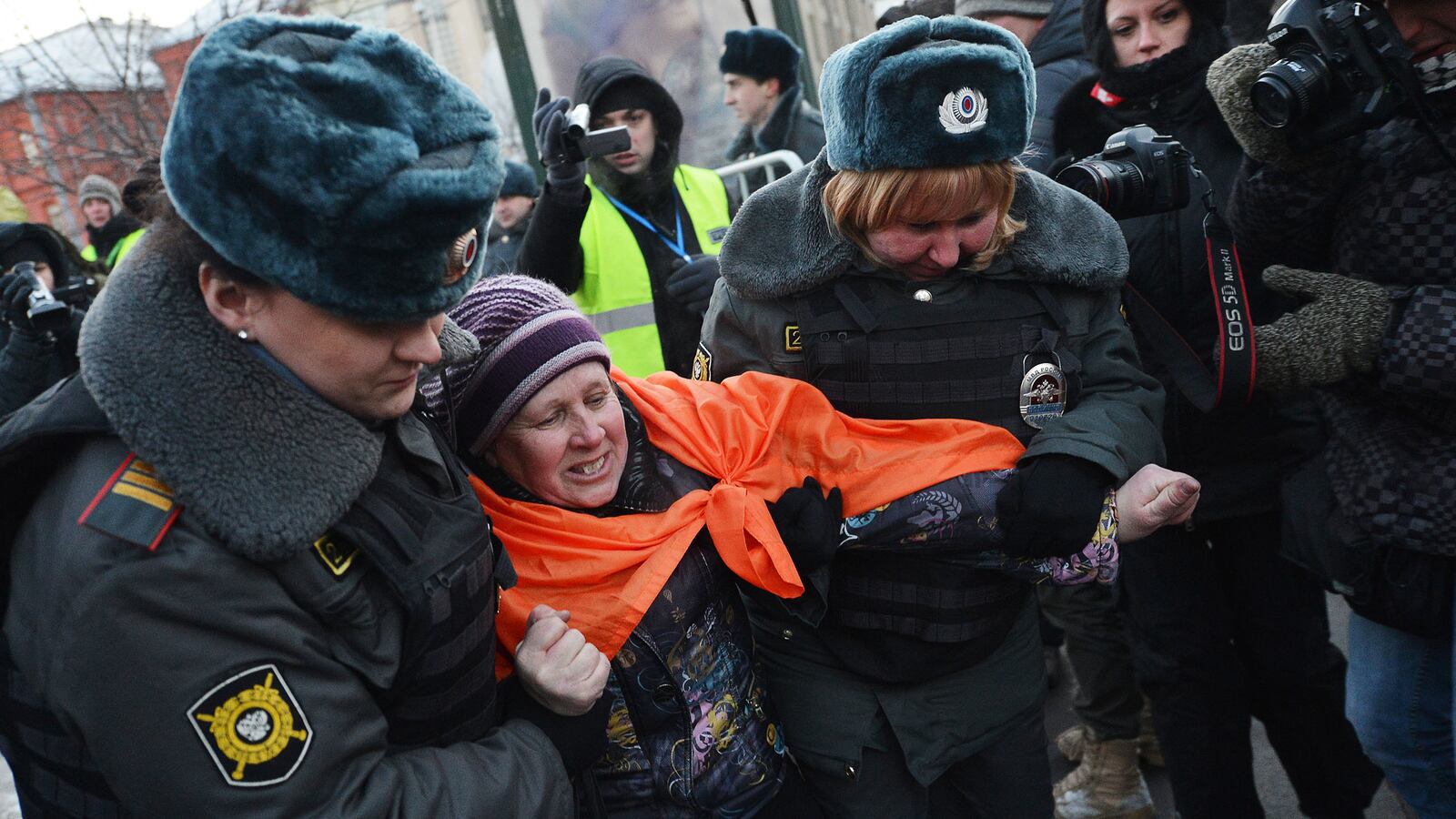Every week, the police summon people who have been to street protests around Russia, while in Moscow, prosecutors question activists in connection with violent clashes at an anti-Putin rally on May 6 on Bolotnaya Square. Political refugees say they will not return while the Russian court system remains compromised, and law enforcement agents continue to violate human rights.

Last month, Suren Gazarian, a 38-year-old environmental activist, received a telegram: police invited him to come and answer questions in a criminal case against him. The trip could mean five years in prison, if he were arrested at the interrogation, as often happens. Earlier this year, Gazarian had already been convicted to three years of probation for causing damage of private property: he had written “This is Our Forest!” on a fence around a mansion belonging to Krasnodar Governor Alexander Tkachev, and that activists say violates environmental laws. This time, the police said Gazarian had threatened the lives of security guards outside a luxurious palace on the Black Sea that Gazarian and his group’s activists believe belongs to President Vladimir Putin. They say its construction violated legal requirements for building in the area.
“I knew that governor Tkachev considered me his enemy for proving that the mansion on the Black Sea, built in violation of water and forest codes, actually belonged to him, on official papers.” Gazarian said. “I had information that Tkachev had personally ordered the police to put me in jail. So, I decided to leave the country,” Gazarian said in a phone interview.
Gazarian took his backpack with a few personal items, said goodbye to his wife and his two daughters and hopped on a bus. After traveling and hiding for a month, he showed up in Tallinn, Estonia, last week and asked for political asylum. He rented an apartment with grant money he said he’d received from an NGO, Front Line Defenders.
“The authorities are determined to silence Gazarian… because he refused to stop criticizing authorities for corruption and for environmental issues,” said Yulia Gorbunova, a Moscow-based researcher at Human Rights Watch. “The authorities need to end their blatant retaliation against government critics.”
Activists are hardly the only ones on the move. Young Russian scientists leave to be able to continue their professional activities. Businessmen who feel insecure take their money and run. According to Levada center social polls, the percentage of Russians planning to leave the country has increased by half, from 13 to 20 percent, in the past three years.
Members of the Coordinating Council, a body elected by opposition supporters, report that as many as 70 political activists have escaped from Russia since last summer, many after being questioned or fearing arrest on charges related to political activity.
“I receive phone calls from friends asking for help,” one of the key opposition leaders, Ilya Yashin, said.
Yashin, who said he had made the choice to remain in Russia, listed the names of those who have made it safely to Europe or neighboring Ukraine. “Many of our friends are already in jail for expressing their views against Putin and his party; to avoid prison time, activists drive to Belarus and then to Ukraine, where they ask the United Nations for political protection.”
Until recently, Ukraine was a safe place for Russian refugees. But in October, men in black masks kidnapped one of them, Leonid Razvozzhayev, from a parking lot near the office of his lawyer, who was helping Razvozvozzhayev to apply for asylum with the United Nations High Commissioner for Refugees.
A few days later, Razvozvozzhayev was seen back in Russia—in a video showing him being bustled into a courthouse and yelling to whoever might be listening that he had been tortured. Razvozzhayev’s lawyers said that their client’s abductors, who are still not identified, kept him in a basement without food for two days and forced him to sign papers admitting all the allegations against him. Those papers later helped Russian authorities start a criminal case against the activist.
“After the case with Razvozzhayev, I became much more careful walking around Kiev,” one of the opposition rally organizers, Mikhail Maglov, 24, said in a phone interview. Maglov escaped from Moscow last August, after police questioned him for several hours. His friends drove him to Gomel, in Belarus, and then to Kiev, where Maglov asked both the UN and the Ukrainian government for political asylum.
Putin’s opponents are supported by exiles from the Belarusian opposition, who have been living in Poland and Baltic countries since a 2010 crackdown in Belarus, after President Alexander Lukashenko won reelection in a contest opposition figures said was tainted by violence and dirty tricks. Since then, the Belarusian opposition have become expert in finding border crossings in the region that can be crossed from inside of a trunk, and on the U.N. policies on asylum seekers.
“Prison destroys people; Russian activists facing prison are right to leave the country, they will be much more useful for their movements if they continue to struggle against injustice abroad,” said Pavel Marinich, who walked across the boarder with Lithuania, leaving his son, his home and business behind in Belarus “for as long as Lukashenka is in power.”
What pushes people out of Russia is the lack of hope for fairness and deep frustration with “deaf and blind court system,” said Svetlana Gannushkina, the head of Citizen’s Assistance group. After a decade of reporting to Putin on violations of refugee rights, Gannushkina quit the Kremlin’s human rights council this year.
“In vain we fight for improving the court system,” Gannushkina said with emotion. Even cases that have zero connection with politics can soon become political once in the court system, where nobody is interested in finding out the truth. “I understand why young people choose to become refugees; I quit the Kremlin’s council because I lost my hope in Vladimir Putin.”






